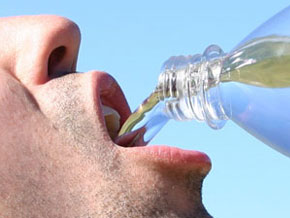Bottled Drinking Water
Today, many have made the switch—drinking water purified from filtration systems instead of ordinary tap water. Water, while being everywhere, has reached a demand where purified water prices are at a premium. Being required to take eight glasses of water daily, the purified water alternative is a good precaution against any waterborne contaminants or diseases, justifying the demand for this resource.
At a little less than half the price of gasoline for each gallon, water fulfills a need and a demand, thereby justifying the business. But the cost is not all about the water. It is also about the containers for the water that consumers are forced to buy.
Plastic: Recyclable and Reusable
Being cheap and reusable, it is a practical business solution to use plastic for water containers. Bottled drinking water is also light and portable, with less risk of breakage or leaks while traveling. With these advantages, it is no wonder that plastic water bottles are common in everyday use.
However, there are several different kinds of plastics, and not all of them are safe containers, especially for the human consumption of water. Some plastics have a lifespan, being reusable only within a certain time frame. Other plastics leach chemicals into the water such as BPA and phthalate, which affects the human body, negatively. There are health and environmental risks involved, from the production of the plastic, to its use.
Various environmental groups continue to decry the pervasive and continued use of plastic. But sadly, the fact that it is a cheap business solution for distribution, transport, delivery and packaging still weighs heavier than the environment and people’s health.
Glass Water Bottles
If you want to go green, glass water bottles are the way to go. Glass water bottles are more difficult to produce than those made of plastic, and that is all the advantage plastic bottles have when compared to glass. Some glass bottled drinking water come with a silicone case, taking away the breakage variable. From cap to bottle, glass bottles are completely recyclable. In addition, most glass water bottles are dishwasher-safe, so they are reusable until you break them.
Like most sustainable, environment-friendly habits, it is the initial cost that is the greatest deterrent. Glass water bottles cost a little more than plastic, and that is something people need to also consider. However, the water you drink is the water you put into the bottle. The fact that no chemicals get added to your purified water should be more than enough reason for you to use a water bottle made of glass.
The Need for Water
Water is water, and regardless of health and environmental concerns, you will get water from whatever container is easily available, be it ceramic, glass, or plastic. The concern should be placed on the availability of potable or drinkable water, and the environmental and health issues will follow its lead. A flourishing business and an insistent need for clean water does demand cleaner and safer containers, but not the other way around.

